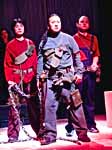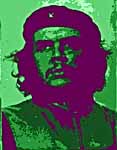|
On a dimly lit stage
in a cramped downtown auditorium, a revolution is taking
place. It starts with a sudden burst of light and the
chatter of young Chinese men and women playing out one
of the most heated battles of modern history: Capitalism
vs. Communism. Hanging overhead is a huge red and black
portrait depicting one of late 20th century's most revered
revolutionary heroes: South American guerrilla leader
Che Guevara.
But this stage is not
located in Argentina, Guevara's birthplace, or Cuba,
the land he helped free, but in Beijing. On April 12,
a new experimental drama about the famous sultry-eyed,
cigar-smoking revolutionary, appropriately titled Che
Guevara, opened at the Beijing People's Art Theater.
Conceived by playwright Huang Jisu and performed by
an eclectic group of actors, artists and musicians,
this play is a revolution in its own right in the capital's
art scene.

Firstly, the group is
putting on the production independently, without the
official backing of an established theater company or
the support of a work unit. Its 10 to 15 members represent
a new generation of Chinese who are choosing to create
unofficial networks, particularly in the arts, in response
to the dwindling number of government-sponsored jobs
and work units. Collectively, they refer to themselves
as beipiao, or "Beijing drifters." Consequently, it
comes as little surprise that this rebel theatrical
group has chosen one of the world's most notorious drifters
and non-conformists, Guevara, as the subject of its
first production.
"Che was a totally free
spirit," says the play's producer Yuan Hong, who produced
most of director Meng Jinghui's works, such as last
year's hugely successful Bootleg Faust "His life represented
nomadic wandering and non-conformity, which many people
in this society can relate to. He utterly refused to
be forced to lead a fixed life. This was something Che
always tried to resist."
Born in Argentina to
activist parents, Ernesto 'Che' Guevara (1928-1967)
studied medicine at the University of Buenos Aires.
Convinced that revoltion was the only cure for South
America's social inequalities, Guevara joined exiled
Cuban revolutionaries under Fidel Castro in Mexico.
From there he played an instrumental role in the Cuban
Revolution of 1956-1959 and afterward served as Castro's
second-in-command.
But Guevara's work was
not done. As a strong opponent of capitalist oligarchy
and U.S. imperialism, he devoted his life to the global
cause for Communism. To do this, he often traveled in
disguise to Asia and Africa to promote and assist armed
revolts.
His appreciation of
Mao Zedong's compositions about guerrilla warfare written
during the Chinese Civil War brought Guevara to China
in the spring of 1964. Guevara returned to South America
where he was eventually captured and executed in Bolivia
in October, 1967. He was 39.
Nearly 30 years later,
his body was exhumed from its mass grave outside Vallegrande,
Bolivia, and returned to Cuba. The events renewed worldwide
interest in his life, ideas and the events leading up
to execution.
It was this revival
that inspired Huang to write a play about Guevara, whose
story is unfamiliar to most Chinese. Moved by Guevara's
fight against social injustice, Huang set out to create
a piece that would be part historical reverence and
part satire of Chinese society. Some scenes re-enact
uprisings in Cuba while others reflect contemporary
Beijing street-life.
Nine artists perform,
sing and dance their way through the show's disparate
and often chaotic scenes, through which the occasional
offstage voice of Guevara narrates. Faced with an array
of events, some taking place in revolutionary Cuba and
others taking place in a Beijing hair salon, the audience
is left to digest a bewildering visual and intellectual
montage. Throw in dialogue that meshes philosophical
discussion and Beijing street slang and it is easy to
understand why the troupe repeatedly explains that it
is simply experimenting with experimental theater.
With all this topsyturvydom,
the troupe is emulating the style of previous experimental
drama, in particular the semi-improvised, fringe theatre
of Beijing director Meng Jinghui, creator of last year's
Rhinoceros in Love and Bootleg Faust. As such, Che Guevara
will most likely be a hit in its own right. One of the
things that makes this play different from Meng's is
that there are four people sitting in the director's
seat instead of one, a decision much in the spirit of
Guevara's heralded fight against convention.
Shen Lin, a writer who
helped write Bootleg Faust and head of the Central Academy
of Drama's Theater Research Institute, immediately expressed
interest in the project when he was approached earlier
this year by Huang. Shen says what attracted him most
was the way in which the script shows how Chinese society
was influenced by the ideals and principals Guevara
stood for.
Other directors include
Zhang Guangtian, a self-confessed hunzi, or hoodlum,
is the musical director. His resume includes playing
the guitar for change in subway stations to more prestigious
jobs such as writing musical scores for countless plays
and films. Zhang provides the Dylan-esque chords that
run through the show's four songs. Yuan Hong, an enterprising
30-year-old native of Sichuan province, infuses the
complex production with ebullient energy. And film director
Wang Huiqing was brought in to help with stage blocking.
"This is creative theater,"
Yuan says, beaming. "There is no one director who oversees
everything. We work as a team, directors with actors,
and pool our ideas on how the scenes should be performed.
For Chinese audiences, Che Guevara marks a new kind
of experimental theater because it is a uniquely collaborative
effort."
The cast includes major
players in mainland Chinese experimental drama. Yang
Ting and Li Mei, two female leads, have both worked
with Meng. Other veterans include actor Du Huanan, who
directed and starred in last summer's production This
Winter isn't Very Cold.
Shen says he hopes that
all this anarchy would earn an approving grin from the
grave from Guevara. But more importantly, he hopes it
will force audiences to reconsider China's rapidly developing
society and what impact this change has had on the collective
Chinese consciousness.
"I want to make the
audience re-evaluate the past 20 years and examine certain
values that I feel have been lost in our society," Shen
says thoughtfully. "It is easy for today's generation
to look back on events in the past and criticize without
realizing what it was like to live through them. They
forget what it takes to be a hero, because nobody believes
in heroism anymore."
Che Guevara will
be performed daily except Mondays at the People's Art
Theater until May 16. Shows start at 7:15 pm. Tickets
are RMB50 and RMB80, and RMB25 for students. See Zhao
Le Directory for venue information.
|




